Research Inquiry Development in Healthcare: Literature Review Report
VerifiedAdded on 2022/10/04
|10
|2330
|72
Report
AI Summary
This report delves into the critical role of research inquiry in healthcare, emphasizing the use of both quantitative and qualitative research methods. It explores how social scientists employ systematic planning to investigate healthcare-related phenomena, including the analysis of statistical data and in-depth individual experiences. The report highlights the importance of structuring appropriate search terms for systematic reviews and outlines the inclusion and exclusion criteria used in the literature review. It then discusses the benefits of integrated models of care, such as improved patient treatment and satisfaction, while acknowledging the complexities involved in their development and implementation. The report concludes by stressing the importance of research and inquiry in healthcare, advocating for the incorporation of integrated models of care to enhance the quality of research and patient outcomes. It references several sources to support its arguments and emphasizes the significance of ethical considerations in healthcare research.
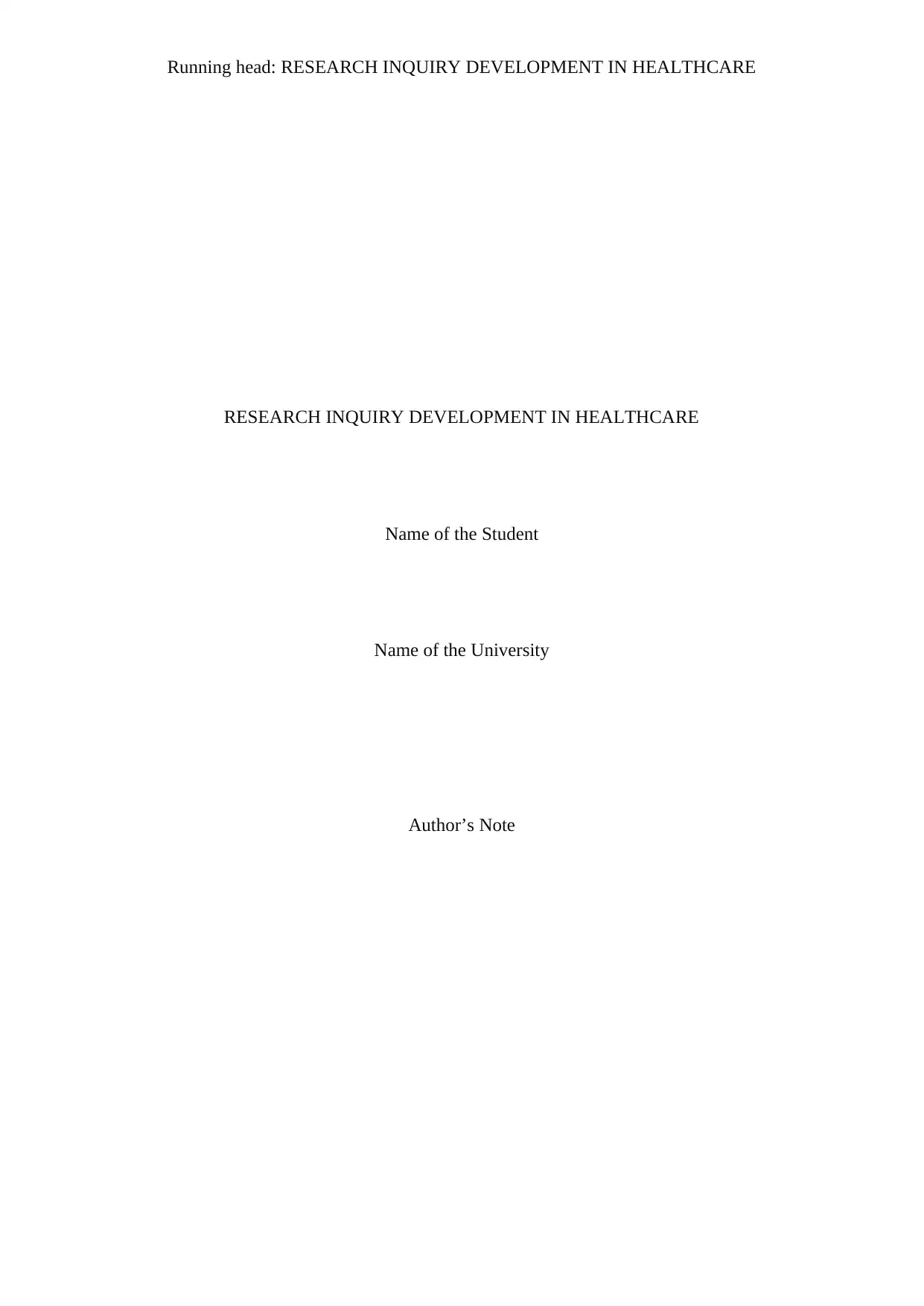
Running head: RESEARCH INQUIRY DEVELOPMENT IN HEALTHCARE
RESEARCH INQUIRY DEVELOPMENT IN HEALTHCARE
Name of the Student
Name of the University
Author’s Note
RESEARCH INQUIRY DEVELOPMENT IN HEALTHCARE
Name of the Student
Name of the University
Author’s Note
Paraphrase This Document
Need a fresh take? Get an instant paraphrase of this document with our AI Paraphraser
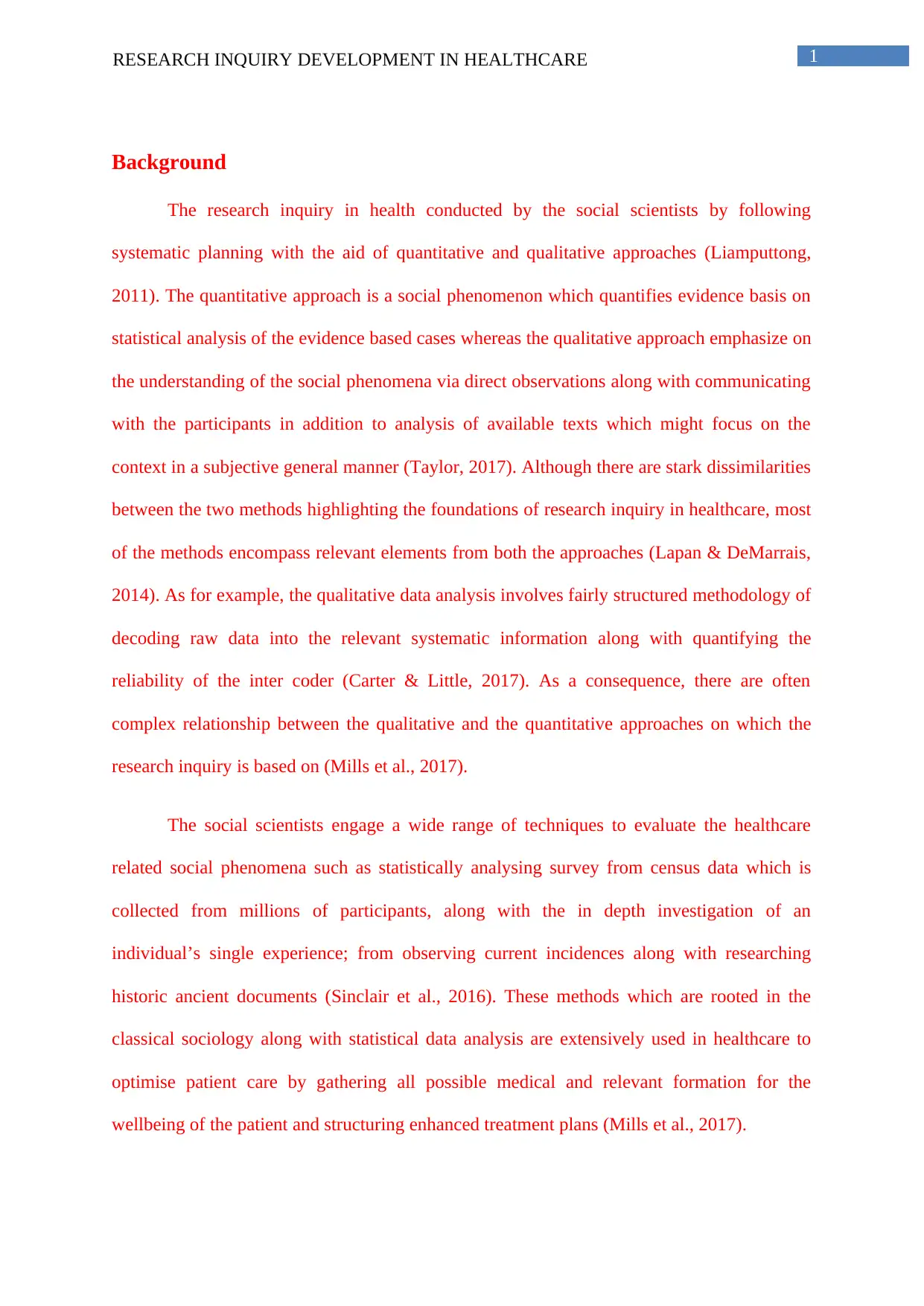
1RESEARCH INQUIRY DEVELOPMENT IN HEALTHCARE
Background
The research inquiry in health conducted by the social scientists by following
systematic planning with the aid of quantitative and qualitative approaches (Liamputtong,
2011). The quantitative approach is a social phenomenon which quantifies evidence basis on
statistical analysis of the evidence based cases whereas the qualitative approach emphasize on
the understanding of the social phenomena via direct observations along with communicating
with the participants in addition to analysis of available texts which might focus on the
context in a subjective general manner (Taylor, 2017). Although there are stark dissimilarities
between the two methods highlighting the foundations of research inquiry in healthcare, most
of the methods encompass relevant elements from both the approaches (Lapan & DeMarrais,
2014). As for example, the qualitative data analysis involves fairly structured methodology of
decoding raw data into the relevant systematic information along with quantifying the
reliability of the inter coder (Carter & Little, 2017). As a consequence, there are often
complex relationship between the qualitative and the quantitative approaches on which the
research inquiry is based on (Mills et al., 2017).
The social scientists engage a wide range of techniques to evaluate the healthcare
related social phenomena such as statistically analysing survey from census data which is
collected from millions of participants, along with the in depth investigation of an
individual’s single experience; from observing current incidences along with researching
historic ancient documents (Sinclair et al., 2016). These methods which are rooted in the
classical sociology along with statistical data analysis are extensively used in healthcare to
optimise patient care by gathering all possible medical and relevant formation for the
wellbeing of the patient and structuring enhanced treatment plans (Mills et al., 2017).
Background
The research inquiry in health conducted by the social scientists by following
systematic planning with the aid of quantitative and qualitative approaches (Liamputtong,
2011). The quantitative approach is a social phenomenon which quantifies evidence basis on
statistical analysis of the evidence based cases whereas the qualitative approach emphasize on
the understanding of the social phenomena via direct observations along with communicating
with the participants in addition to analysis of available texts which might focus on the
context in a subjective general manner (Taylor, 2017). Although there are stark dissimilarities
between the two methods highlighting the foundations of research inquiry in healthcare, most
of the methods encompass relevant elements from both the approaches (Lapan & DeMarrais,
2014). As for example, the qualitative data analysis involves fairly structured methodology of
decoding raw data into the relevant systematic information along with quantifying the
reliability of the inter coder (Carter & Little, 2017). As a consequence, there are often
complex relationship between the qualitative and the quantitative approaches on which the
research inquiry is based on (Mills et al., 2017).
The social scientists engage a wide range of techniques to evaluate the healthcare
related social phenomena such as statistically analysing survey from census data which is
collected from millions of participants, along with the in depth investigation of an
individual’s single experience; from observing current incidences along with researching
historic ancient documents (Sinclair et al., 2016). These methods which are rooted in the
classical sociology along with statistical data analysis are extensively used in healthcare to
optimise patient care by gathering all possible medical and relevant formation for the
wellbeing of the patient and structuring enhanced treatment plans (Mills et al., 2017).
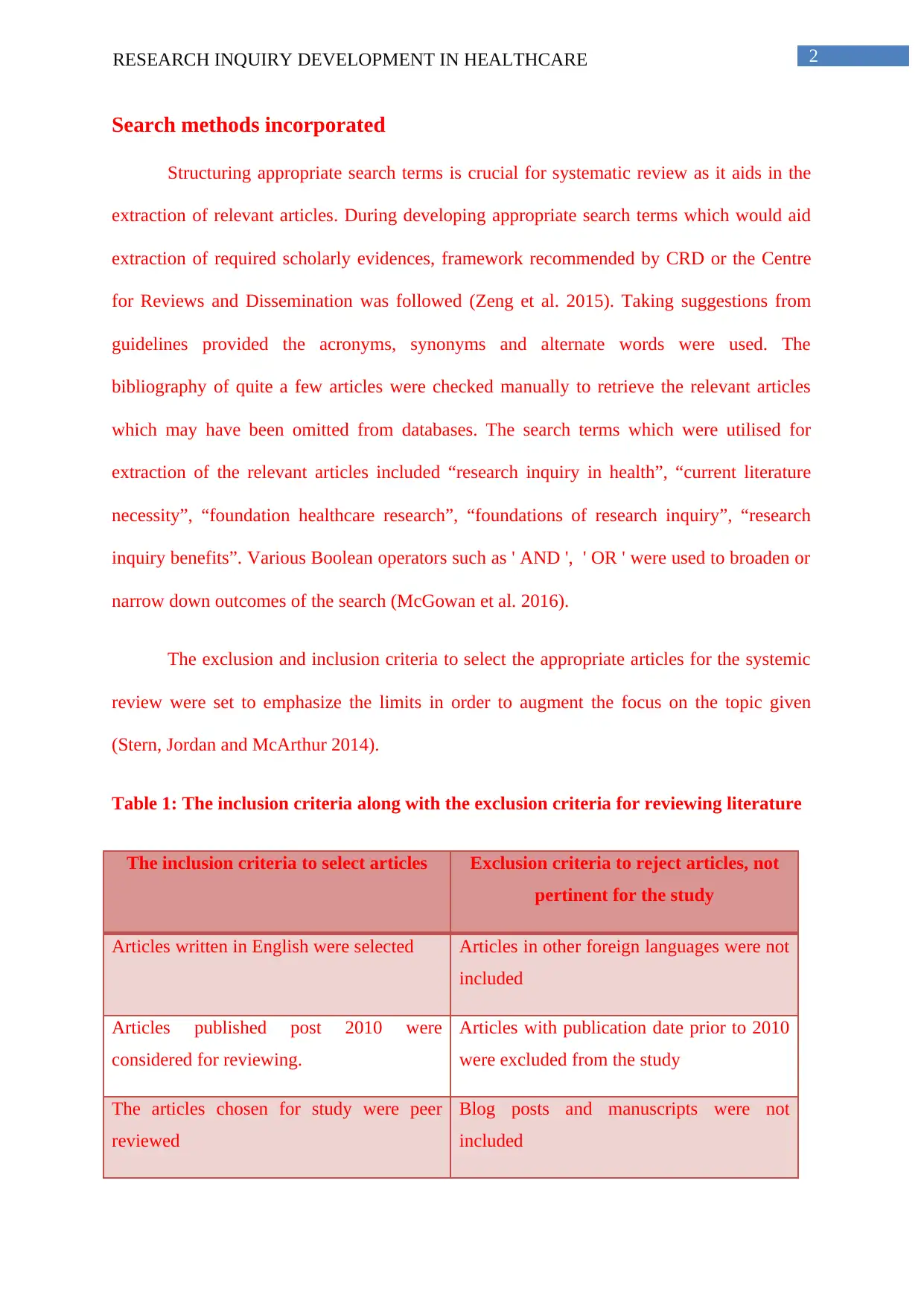
2RESEARCH INQUIRY DEVELOPMENT IN HEALTHCARE
Search methods incorporated
Structuring appropriate search terms is crucial for systematic review as it aids in the
extraction of relevant articles. During developing appropriate search terms which would aid
extraction of required scholarly evidences, framework recommended by CRD or the Centre
for Reviews and Dissemination was followed (Zeng et al. 2015). Taking suggestions from
guidelines provided the acronyms, synonyms and alternate words were used. The
bibliography of quite a few articles were checked manually to retrieve the relevant articles
which may have been omitted from databases. The search terms which were utilised for
extraction of the relevant articles included “research inquiry in health”, “current literature
necessity”, “foundation healthcare research”, “foundations of research inquiry”, “research
inquiry benefits”. Various Boolean operators such as ' AND ', ' OR ' were used to broaden or
narrow down outcomes of the search (McGowan et al. 2016).
The exclusion and inclusion criteria to select the appropriate articles for the systemic
review were set to emphasize the limits in order to augment the focus on the topic given
(Stern, Jordan and McArthur 2014).
Table 1: The inclusion criteria along with the exclusion criteria for reviewing literature
The inclusion criteria to select articles Exclusion criteria to reject articles, not
pertinent for the study
Articles written in English were selected Articles in other foreign languages were not
included
Articles published post 2010 were
considered for reviewing.
Articles with publication date prior to 2010
were excluded from the study
The articles chosen for study were peer
reviewed
Blog posts and manuscripts were not
included
Search methods incorporated
Structuring appropriate search terms is crucial for systematic review as it aids in the
extraction of relevant articles. During developing appropriate search terms which would aid
extraction of required scholarly evidences, framework recommended by CRD or the Centre
for Reviews and Dissemination was followed (Zeng et al. 2015). Taking suggestions from
guidelines provided the acronyms, synonyms and alternate words were used. The
bibliography of quite a few articles were checked manually to retrieve the relevant articles
which may have been omitted from databases. The search terms which were utilised for
extraction of the relevant articles included “research inquiry in health”, “current literature
necessity”, “foundation healthcare research”, “foundations of research inquiry”, “research
inquiry benefits”. Various Boolean operators such as ' AND ', ' OR ' were used to broaden or
narrow down outcomes of the search (McGowan et al. 2016).
The exclusion and inclusion criteria to select the appropriate articles for the systemic
review were set to emphasize the limits in order to augment the focus on the topic given
(Stern, Jordan and McArthur 2014).
Table 1: The inclusion criteria along with the exclusion criteria for reviewing literature
The inclusion criteria to select articles Exclusion criteria to reject articles, not
pertinent for the study
Articles written in English were selected Articles in other foreign languages were not
included
Articles published post 2010 were
considered for reviewing.
Articles with publication date prior to 2010
were excluded from the study
The articles chosen for study were peer
reviewed
Blog posts and manuscripts were not
included
⊘ This is a preview!⊘
Do you want full access?
Subscribe today to unlock all pages.

Trusted by 1+ million students worldwide
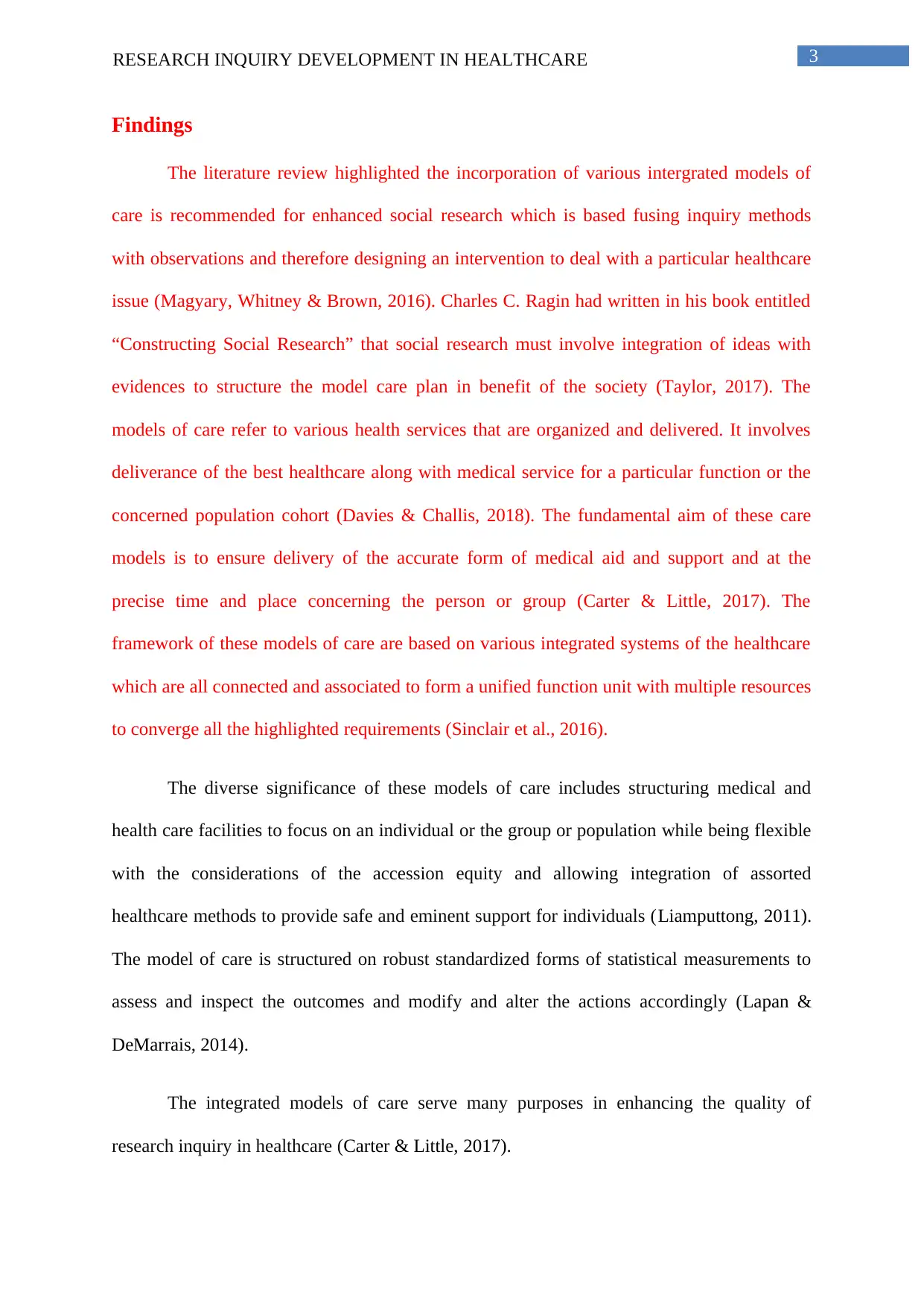
3RESEARCH INQUIRY DEVELOPMENT IN HEALTHCARE
Findings
The literature review highlighted the incorporation of various intergrated models of
care is recommended for enhanced social research which is based fusing inquiry methods
with observations and therefore designing an intervention to deal with a particular healthcare
issue (Magyary, Whitney & Brown, 2016). Charles C. Ragin had written in his book entitled
“Constructing Social Research” that social research must involve integration of ideas with
evidences to structure the model care plan in benefit of the society (Taylor, 2017). The
models of care refer to various health services that are organized and delivered. It involves
deliverance of the best healthcare along with medical service for a particular function or the
concerned population cohort (Davies & Challis, 2018). The fundamental aim of these care
models is to ensure delivery of the accurate form of medical aid and support and at the
precise time and place concerning the person or group (Carter & Little, 2017). The
framework of these models of care are based on various integrated systems of the healthcare
which are all connected and associated to form a unified function unit with multiple resources
to converge all the highlighted requirements (Sinclair et al., 2016).
The diverse significance of these models of care includes structuring medical and
health care facilities to focus on an individual or the group or population while being flexible
with the considerations of the accession equity and allowing integration of assorted
healthcare methods to provide safe and eminent support for individuals (Liamputtong, 2011).
The model of care is structured on robust standardized forms of statistical measurements to
assess and inspect the outcomes and modify and alter the actions accordingly (Lapan &
DeMarrais, 2014).
The integrated models of care serve many purposes in enhancing the quality of
research inquiry in healthcare (Carter & Little, 2017).
Findings
The literature review highlighted the incorporation of various intergrated models of
care is recommended for enhanced social research which is based fusing inquiry methods
with observations and therefore designing an intervention to deal with a particular healthcare
issue (Magyary, Whitney & Brown, 2016). Charles C. Ragin had written in his book entitled
“Constructing Social Research” that social research must involve integration of ideas with
evidences to structure the model care plan in benefit of the society (Taylor, 2017). The
models of care refer to various health services that are organized and delivered. It involves
deliverance of the best healthcare along with medical service for a particular function or the
concerned population cohort (Davies & Challis, 2018). The fundamental aim of these care
models is to ensure delivery of the accurate form of medical aid and support and at the
precise time and place concerning the person or group (Carter & Little, 2017). The
framework of these models of care are based on various integrated systems of the healthcare
which are all connected and associated to form a unified function unit with multiple resources
to converge all the highlighted requirements (Sinclair et al., 2016).
The diverse significance of these models of care includes structuring medical and
health care facilities to focus on an individual or the group or population while being flexible
with the considerations of the accession equity and allowing integration of assorted
healthcare methods to provide safe and eminent support for individuals (Liamputtong, 2011).
The model of care is structured on robust standardized forms of statistical measurements to
assess and inspect the outcomes and modify and alter the actions accordingly (Lapan &
DeMarrais, 2014).
The integrated models of care serve many purposes in enhancing the quality of
research inquiry in healthcare (Carter & Little, 2017).
Paraphrase This Document
Need a fresh take? Get an instant paraphrase of this document with our AI Paraphraser
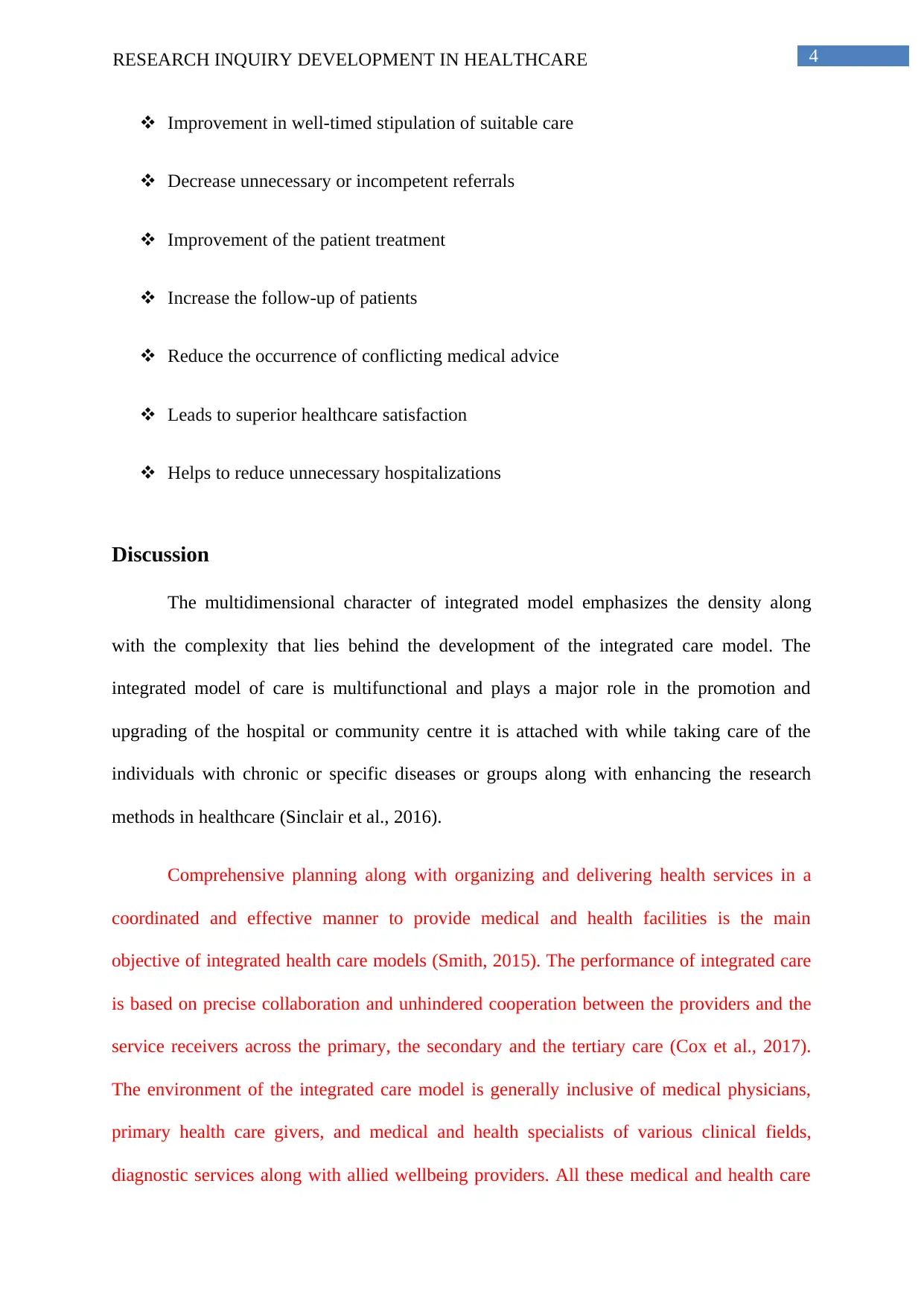
4RESEARCH INQUIRY DEVELOPMENT IN HEALTHCARE
Improvement in well-timed stipulation of suitable care
Decrease unnecessary or incompetent referrals
Improvement of the patient treatment
Increase the follow-up of patients
Reduce the occurrence of conflicting medical advice
Leads to superior healthcare satisfaction
Helps to reduce unnecessary hospitalizations
Discussion
The multidimensional character of integrated model emphasizes the density along
with the complexity that lies behind the development of the integrated care model. The
integrated model of care is multifunctional and plays a major role in the promotion and
upgrading of the hospital or community centre it is attached with while taking care of the
individuals with chronic or specific diseases or groups along with enhancing the research
methods in healthcare (Sinclair et al., 2016).
Comprehensive planning along with organizing and delivering health services in a
coordinated and effective manner to provide medical and health facilities is the main
objective of integrated health care models (Smith, 2015). The performance of integrated care
is based on precise collaboration and unhindered cooperation between the providers and the
service receivers across the primary, the secondary and the tertiary care (Cox et al., 2017).
The environment of the integrated care model is generally inclusive of medical physicians,
primary health care givers, and medical and health specialists of various clinical fields,
diagnostic services along with allied wellbeing providers. All these medical and health care
Improvement in well-timed stipulation of suitable care
Decrease unnecessary or incompetent referrals
Improvement of the patient treatment
Increase the follow-up of patients
Reduce the occurrence of conflicting medical advice
Leads to superior healthcare satisfaction
Helps to reduce unnecessary hospitalizations
Discussion
The multidimensional character of integrated model emphasizes the density along
with the complexity that lies behind the development of the integrated care model. The
integrated model of care is multifunctional and plays a major role in the promotion and
upgrading of the hospital or community centre it is attached with while taking care of the
individuals with chronic or specific diseases or groups along with enhancing the research
methods in healthcare (Sinclair et al., 2016).
Comprehensive planning along with organizing and delivering health services in a
coordinated and effective manner to provide medical and health facilities is the main
objective of integrated health care models (Smith, 2015). The performance of integrated care
is based on precise collaboration and unhindered cooperation between the providers and the
service receivers across the primary, the secondary and the tertiary care (Cox et al., 2017).
The environment of the integrated care model is generally inclusive of medical physicians,
primary health care givers, and medical and health specialists of various clinical fields,
diagnostic services along with allied wellbeing providers. All these medical and health care
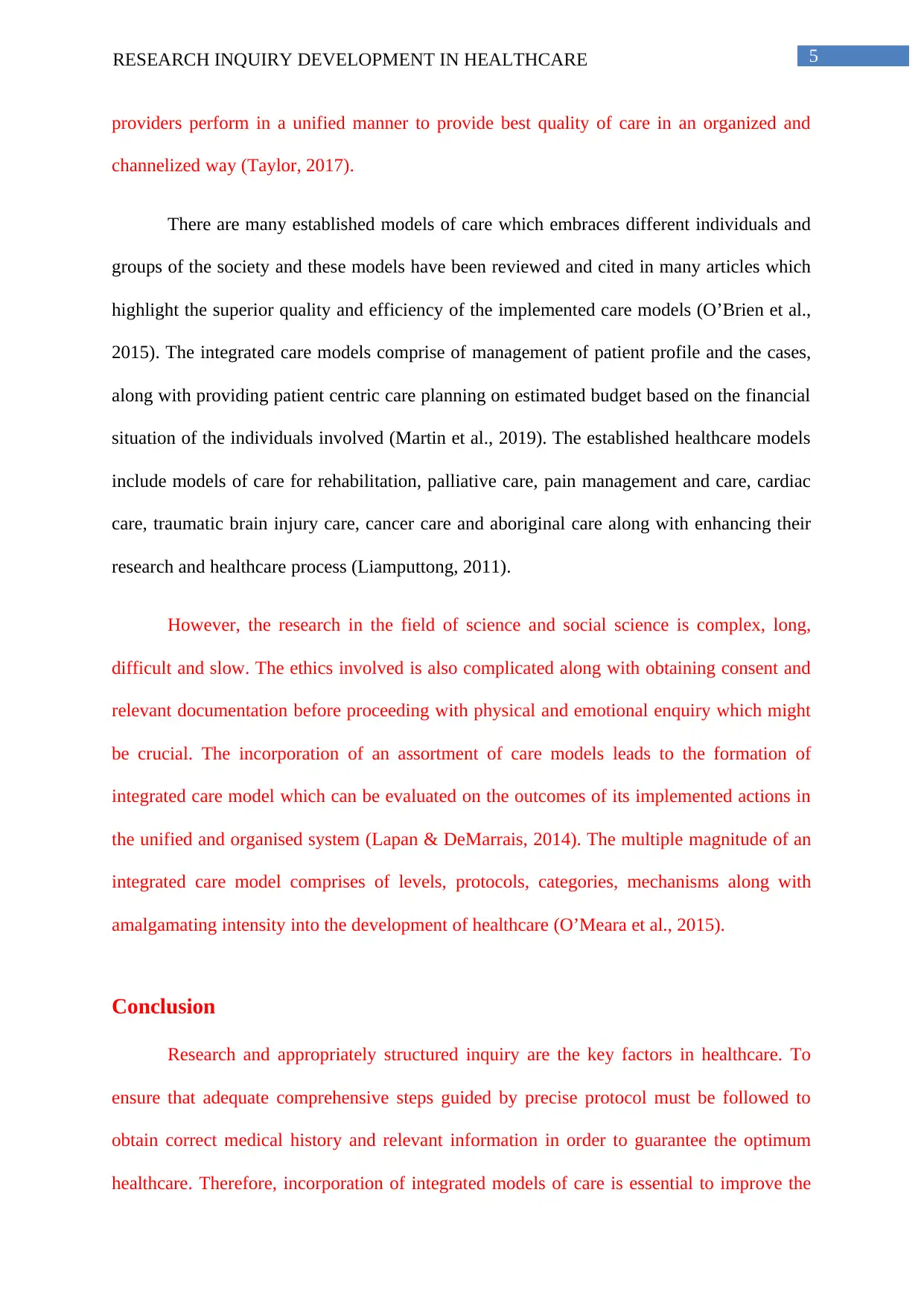
5RESEARCH INQUIRY DEVELOPMENT IN HEALTHCARE
providers perform in a unified manner to provide best quality of care in an organized and
channelized way (Taylor, 2017).
There are many established models of care which embraces different individuals and
groups of the society and these models have been reviewed and cited in many articles which
highlight the superior quality and efficiency of the implemented care models (O’Brien et al.,
2015). The integrated care models comprise of management of patient profile and the cases,
along with providing patient centric care planning on estimated budget based on the financial
situation of the individuals involved (Martin et al., 2019). The established healthcare models
include models of care for rehabilitation, palliative care, pain management and care, cardiac
care, traumatic brain injury care, cancer care and aboriginal care along with enhancing their
research and healthcare process (Liamputtong, 2011).
However, the research in the field of science and social science is complex, long,
difficult and slow. The ethics involved is also complicated along with obtaining consent and
relevant documentation before proceeding with physical and emotional enquiry which might
be crucial. The incorporation of an assortment of care models leads to the formation of
integrated care model which can be evaluated on the outcomes of its implemented actions in
the unified and organised system (Lapan & DeMarrais, 2014). The multiple magnitude of an
integrated care model comprises of levels, protocols, categories, mechanisms along with
amalgamating intensity into the development of healthcare (O’Meara et al., 2015).
Conclusion
Research and appropriately structured inquiry are the key factors in healthcare. To
ensure that adequate comprehensive steps guided by precise protocol must be followed to
obtain correct medical history and relevant information in order to guarantee the optimum
healthcare. Therefore, incorporation of integrated models of care is essential to improve the
providers perform in a unified manner to provide best quality of care in an organized and
channelized way (Taylor, 2017).
There are many established models of care which embraces different individuals and
groups of the society and these models have been reviewed and cited in many articles which
highlight the superior quality and efficiency of the implemented care models (O’Brien et al.,
2015). The integrated care models comprise of management of patient profile and the cases,
along with providing patient centric care planning on estimated budget based on the financial
situation of the individuals involved (Martin et al., 2019). The established healthcare models
include models of care for rehabilitation, palliative care, pain management and care, cardiac
care, traumatic brain injury care, cancer care and aboriginal care along with enhancing their
research and healthcare process (Liamputtong, 2011).
However, the research in the field of science and social science is complex, long,
difficult and slow. The ethics involved is also complicated along with obtaining consent and
relevant documentation before proceeding with physical and emotional enquiry which might
be crucial. The incorporation of an assortment of care models leads to the formation of
integrated care model which can be evaluated on the outcomes of its implemented actions in
the unified and organised system (Lapan & DeMarrais, 2014). The multiple magnitude of an
integrated care model comprises of levels, protocols, categories, mechanisms along with
amalgamating intensity into the development of healthcare (O’Meara et al., 2015).
Conclusion
Research and appropriately structured inquiry are the key factors in healthcare. To
ensure that adequate comprehensive steps guided by precise protocol must be followed to
obtain correct medical history and relevant information in order to guarantee the optimum
healthcare. Therefore, incorporation of integrated models of care is essential to improve the
⊘ This is a preview!⊘
Do you want full access?
Subscribe today to unlock all pages.

Trusted by 1+ million students worldwide
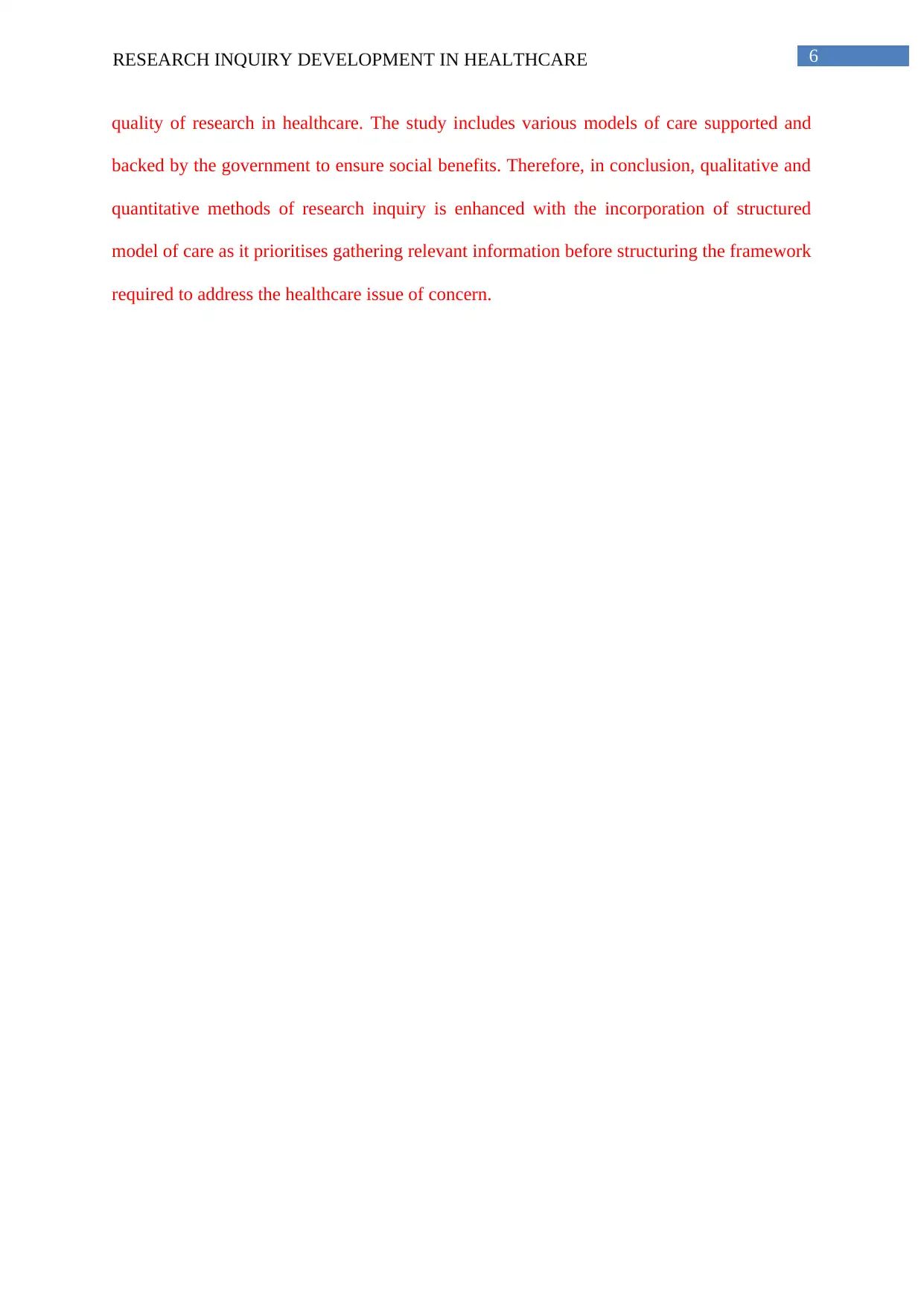
6RESEARCH INQUIRY DEVELOPMENT IN HEALTHCARE
quality of research in healthcare. The study includes various models of care supported and
backed by the government to ensure social benefits. Therefore, in conclusion, qualitative and
quantitative methods of research inquiry is enhanced with the incorporation of structured
model of care as it prioritises gathering relevant information before structuring the framework
required to address the healthcare issue of concern.
quality of research in healthcare. The study includes various models of care supported and
backed by the government to ensure social benefits. Therefore, in conclusion, qualitative and
quantitative methods of research inquiry is enhanced with the incorporation of structured
model of care as it prioritises gathering relevant information before structuring the framework
required to address the healthcare issue of concern.
Paraphrase This Document
Need a fresh take? Get an instant paraphrase of this document with our AI Paraphraser
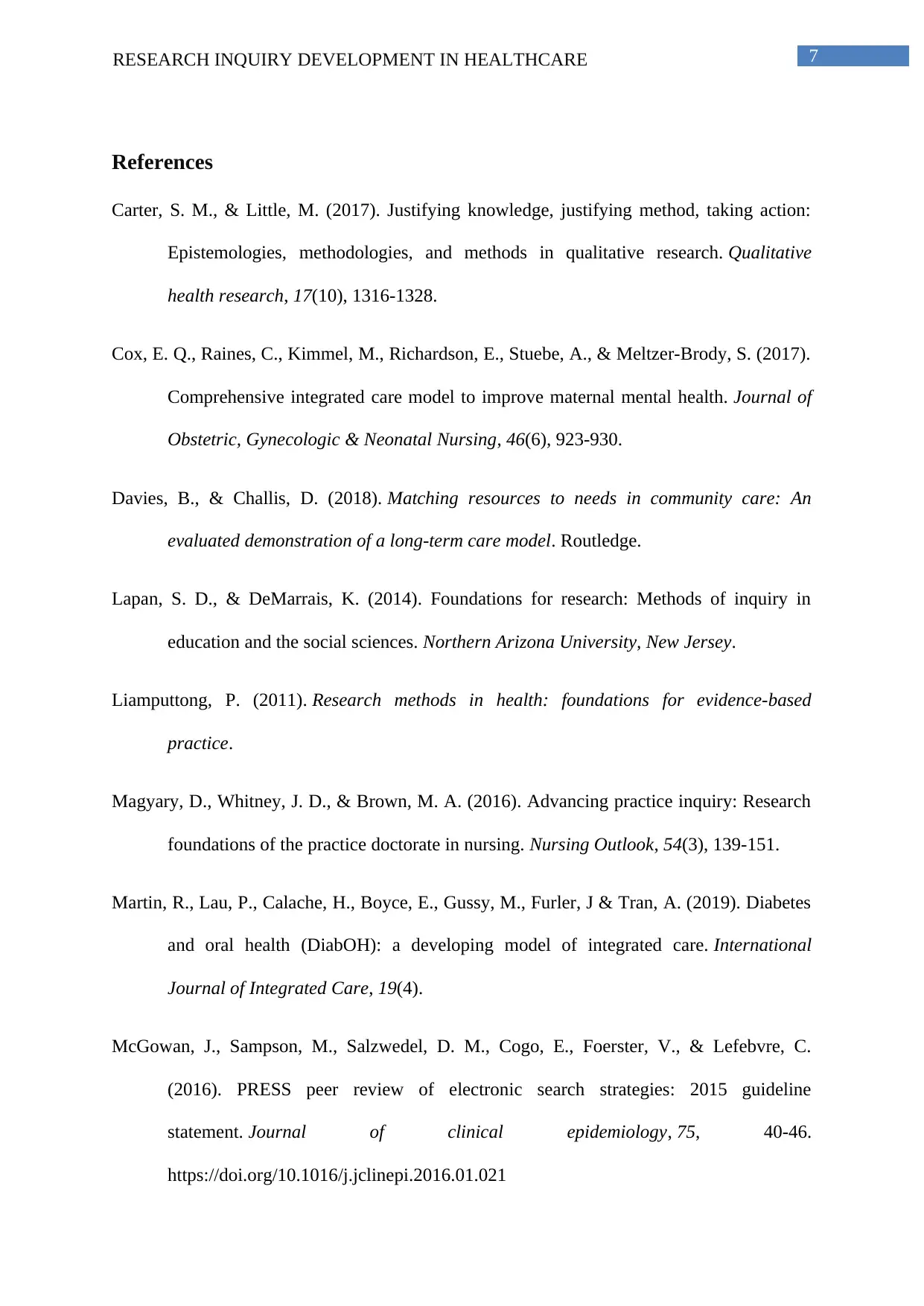
7RESEARCH INQUIRY DEVELOPMENT IN HEALTHCARE
References
Carter, S. M., & Little, M. (2017). Justifying knowledge, justifying method, taking action:
Epistemologies, methodologies, and methods in qualitative research. Qualitative
health research, 17(10), 1316-1328.
Cox, E. Q., Raines, C., Kimmel, M., Richardson, E., Stuebe, A., & Meltzer-Brody, S. (2017).
Comprehensive integrated care model to improve maternal mental health. Journal of
Obstetric, Gynecologic & Neonatal Nursing, 46(6), 923-930.
Davies, B., & Challis, D. (2018). Matching resources to needs in community care: An
evaluated demonstration of a long-term care model. Routledge.
Lapan, S. D., & DeMarrais, K. (2014). Foundations for research: Methods of inquiry in
education and the social sciences. Northern Arizona University, New Jersey.
Liamputtong, P. (2011). Research methods in health: foundations for evidence-based
practice.
Magyary, D., Whitney, J. D., & Brown, M. A. (2016). Advancing practice inquiry: Research
foundations of the practice doctorate in nursing. Nursing Outlook, 54(3), 139-151.
Martin, R., Lau, P., Calache, H., Boyce, E., Gussy, M., Furler, J & Tran, A. (2019). Diabetes
and oral health (DiabOH): a developing model of integrated care. International
Journal of Integrated Care, 19(4).
McGowan, J., Sampson, M., Salzwedel, D. M., Cogo, E., Foerster, V., & Lefebvre, C.
(2016). PRESS peer review of electronic search strategies: 2015 guideline
statement. Journal of clinical epidemiology, 75, 40-46.
https://doi.org/10.1016/j.jclinepi.2016.01.021
References
Carter, S. M., & Little, M. (2017). Justifying knowledge, justifying method, taking action:
Epistemologies, methodologies, and methods in qualitative research. Qualitative
health research, 17(10), 1316-1328.
Cox, E. Q., Raines, C., Kimmel, M., Richardson, E., Stuebe, A., & Meltzer-Brody, S. (2017).
Comprehensive integrated care model to improve maternal mental health. Journal of
Obstetric, Gynecologic & Neonatal Nursing, 46(6), 923-930.
Davies, B., & Challis, D. (2018). Matching resources to needs in community care: An
evaluated demonstration of a long-term care model. Routledge.
Lapan, S. D., & DeMarrais, K. (2014). Foundations for research: Methods of inquiry in
education and the social sciences. Northern Arizona University, New Jersey.
Liamputtong, P. (2011). Research methods in health: foundations for evidence-based
practice.
Magyary, D., Whitney, J. D., & Brown, M. A. (2016). Advancing practice inquiry: Research
foundations of the practice doctorate in nursing. Nursing Outlook, 54(3), 139-151.
Martin, R., Lau, P., Calache, H., Boyce, E., Gussy, M., Furler, J & Tran, A. (2019). Diabetes
and oral health (DiabOH): a developing model of integrated care. International
Journal of Integrated Care, 19(4).
McGowan, J., Sampson, M., Salzwedel, D. M., Cogo, E., Foerster, V., & Lefebvre, C.
(2016). PRESS peer review of electronic search strategies: 2015 guideline
statement. Journal of clinical epidemiology, 75, 40-46.
https://doi.org/10.1016/j.jclinepi.2016.01.021
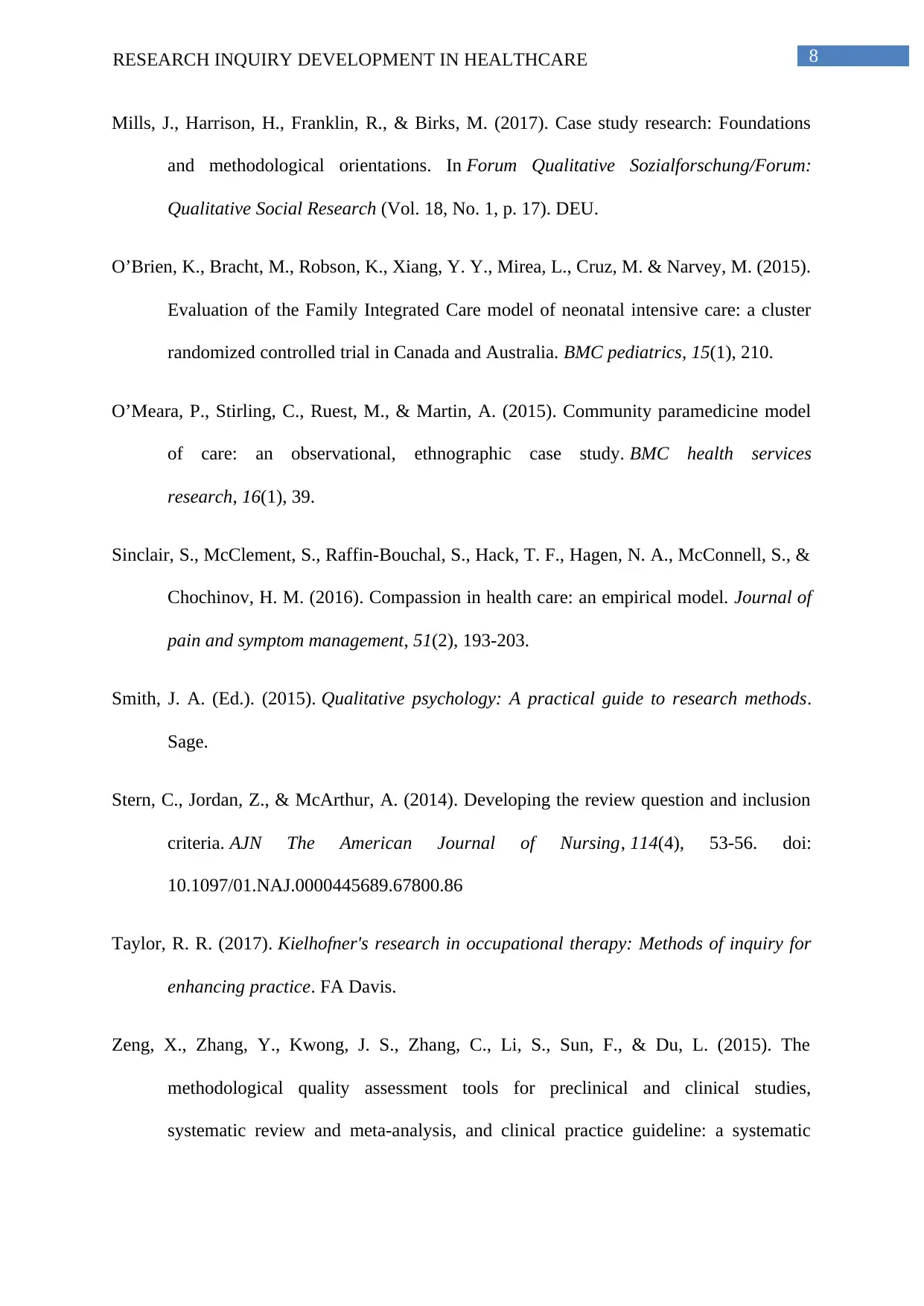
8RESEARCH INQUIRY DEVELOPMENT IN HEALTHCARE
Mills, J., Harrison, H., Franklin, R., & Birks, M. (2017). Case study research: Foundations
and methodological orientations. In Forum Qualitative Sozialforschung/Forum:
Qualitative Social Research (Vol. 18, No. 1, p. 17). DEU.
O’Brien, K., Bracht, M., Robson, K., Xiang, Y. Y., Mirea, L., Cruz, M. & Narvey, M. (2015).
Evaluation of the Family Integrated Care model of neonatal intensive care: a cluster
randomized controlled trial in Canada and Australia. BMC pediatrics, 15(1), 210.
O’Meara, P., Stirling, C., Ruest, M., & Martin, A. (2015). Community paramedicine model
of care: an observational, ethnographic case study. BMC health services
research, 16(1), 39.
Sinclair, S., McClement, S., Raffin-Bouchal, S., Hack, T. F., Hagen, N. A., McConnell, S., &
Chochinov, H. M. (2016). Compassion in health care: an empirical model. Journal of
pain and symptom management, 51(2), 193-203.
Smith, J. A. (Ed.). (2015). Qualitative psychology: A practical guide to research methods.
Sage.
Stern, C., Jordan, Z., & McArthur, A. (2014). Developing the review question and inclusion
criteria. AJN The American Journal of Nursing, 114(4), 53-56. doi:
10.1097/01.NAJ.0000445689.67800.86
Taylor, R. R. (2017). Kielhofner's research in occupational therapy: Methods of inquiry for
enhancing practice. FA Davis.
Zeng, X., Zhang, Y., Kwong, J. S., Zhang, C., Li, S., Sun, F., & Du, L. (2015). The
methodological quality assessment tools for preclinical and clinical studies,
systematic review and meta‐analysis, and clinical practice guideline: a systematic
Mills, J., Harrison, H., Franklin, R., & Birks, M. (2017). Case study research: Foundations
and methodological orientations. In Forum Qualitative Sozialforschung/Forum:
Qualitative Social Research (Vol. 18, No. 1, p. 17). DEU.
O’Brien, K., Bracht, M., Robson, K., Xiang, Y. Y., Mirea, L., Cruz, M. & Narvey, M. (2015).
Evaluation of the Family Integrated Care model of neonatal intensive care: a cluster
randomized controlled trial in Canada and Australia. BMC pediatrics, 15(1), 210.
O’Meara, P., Stirling, C., Ruest, M., & Martin, A. (2015). Community paramedicine model
of care: an observational, ethnographic case study. BMC health services
research, 16(1), 39.
Sinclair, S., McClement, S., Raffin-Bouchal, S., Hack, T. F., Hagen, N. A., McConnell, S., &
Chochinov, H. M. (2016). Compassion in health care: an empirical model. Journal of
pain and symptom management, 51(2), 193-203.
Smith, J. A. (Ed.). (2015). Qualitative psychology: A practical guide to research methods.
Sage.
Stern, C., Jordan, Z., & McArthur, A. (2014). Developing the review question and inclusion
criteria. AJN The American Journal of Nursing, 114(4), 53-56. doi:
10.1097/01.NAJ.0000445689.67800.86
Taylor, R. R. (2017). Kielhofner's research in occupational therapy: Methods of inquiry for
enhancing practice. FA Davis.
Zeng, X., Zhang, Y., Kwong, J. S., Zhang, C., Li, S., Sun, F., & Du, L. (2015). The
methodological quality assessment tools for preclinical and clinical studies,
systematic review and meta‐analysis, and clinical practice guideline: a systematic
⊘ This is a preview!⊘
Do you want full access?
Subscribe today to unlock all pages.

Trusted by 1+ million students worldwide

9RESEARCH INQUIRY DEVELOPMENT IN HEALTHCARE
review. Journal of evidence-based medicine, 8(1), 2-10.
https://doi.org/10.1111/jebm.12141
review. Journal of evidence-based medicine, 8(1), 2-10.
https://doi.org/10.1111/jebm.12141
1 out of 10
Related Documents
Your All-in-One AI-Powered Toolkit for Academic Success.
+13062052269
info@desklib.com
Available 24*7 on WhatsApp / Email
![[object Object]](/_next/static/media/star-bottom.7253800d.svg)
Unlock your academic potential
Copyright © 2020–2025 A2Z Services. All Rights Reserved. Developed and managed by ZUCOL.





